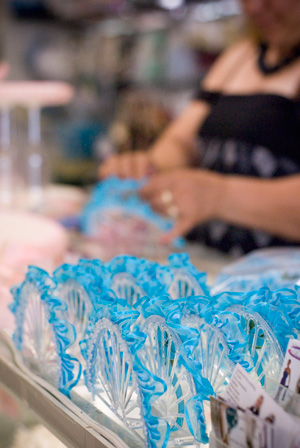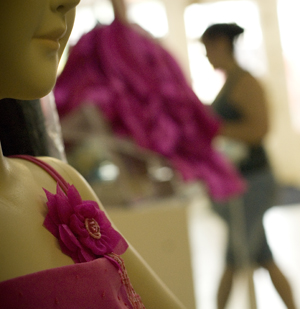Closing the Store?

Leticia works in her wedding supply store in Minneapolis, Minn.
Photo by Sarah Mayer
Leticia has tasted the American Dream and found it bitter. She came to Minneapolis from Mexico in 2000 planning to return a year later with a lot of savings. But just staying afloat in the United States turned out to be far more expensive than she'd expected.
"The year passes by and you've saved nothing and you say, 'OK, next year and then I'll go,'" she says. "And the years keep passing and you haven't saved anything and you haven't done anything."
Like most undocumented Latinos in Minneapolis, Leticia is under growing pressure from the economy and the government to go home.
Leticia agreed to tell her story because she says she has nothing to lose. She's an outspoken 40-year-old, with frizzy auburn hair, blue-green eyes, and a raucous laugh. She laughs a lot, especially when she's around her family, where she's the uncontested matriarch. She and her husband Jose live with their daughter's family in a simple two-story house less than a block from Lake Street. Two other children live near by; another daughter lives with her husband and their kids in the suburbs.
Her sister lives in Minnesota, too, and sometimes she helps Leticia with her business. Leticia runs a party supply store. On a recent Sunday evening, she grabbed her tape measure and her sister for a frantic drive to the suburbs. She had forgotten to measure the groomsmen for a wedding a week away. After several phone calls to get directions, she found the ranch house with the long driveway. The bride-to-be introduced the groom and his five attendants, who'd been watching soccer in another room. Leticia whipped out her tape measure and shouted neck diameters and leg lengths to her sister, who wrote everything down in a tiny notebook. The business was done in less than five minutes. On the way home they stopped to pick up dinner from another customer, who was paying them partly with food.
It's tough for Leticia's customers to afford to pay her these days. Business is down at the store, and that means things aren't going well for the Latino community. Parties are no small thing among people from Mexico and Central America. Normally, dozens of baptisms and birthday parties fill church basements and rental halls every weekend. Many are opulent affairs, with lots of decorations and children dressed in formal wear.

Shelves at Leticia's store are filled with tiny statuettes.
Photo by Sarah Mayer
Leticia's Lake Street store is long and narrow, with tall ceilings. Bridal gowns and frilly dresses cascade from racks along the walls. Shelves are filled with tiny statuettes and shiny ornaments that are available as party favors or cake decorations. Heavy three-ring binders offer dresses and trinkets on order. Leticia hand-ties intricate ribbon flowers on guest books. She tailors tuxes and dresses. She says the wedding business is down - way down. Quinceañeras and baptisms are barely helping her make rent. "Right now, people aren't buying because they don't have jobs," she says.
She says rent for her store is $1800. She's trying to find a buyer to take over her business, because the recession has made it impossible to turn a profit.
It's not what she expected when she came here.
Eight and a half years ago, Leticia saved and borrowed more than $10,000 to move her family to Minnesota. A coyote helped her and Jose bring their four children, a daughter-in-law and a baby grandson. Immediately the adults bought green cards and social security numbers from street vendors for $100 each.
"The first thing you have to do is get documents that don't belong to you," she says. "It's from that point that we're forced to do what we shouldn't do."
Leticia was lucky she came before 9/11, when immigration laws toughened in the name of national security. Back then, it was still possible for illegal immigrants to get state IDs and driver's licenses, so she and her husband did. She and Jose own eight cars - one each for them, their children and their children's spouses. Everybody in the family works as much as they can, and everyone contributes to paying the bills.
Leticia's daughters work in a greenhouse that sells to retail garden centers, and the men work in construction and landscaping. No one earns more than $10 an hour. No one gets benefits and no one earns overtime. Much of the work is seasonal.
The bills at home are mounting, thanks to a subprime loan Leticia unwittingly signed two years ago. She doesn't understand why her interest rate has risen more than three points, driving the payment up to $2000 a month. Leticia says she can't afford that, and she feels betrayed by the man who represented himself as a realtor.
"I won't say any names but he was Latino," she says. "All the documents were in English and I signed and signed and signed. And you don't know what you're signing. If Latinos are buying, why not have the documents in Spanish so we'll know what it says?
"As Latinos, we talk amongst each other and ask how we're all doing with our homes. And the majority will tell you that they are about to lose their homes because the interest rate went up."

Leticia and her husband plan to return to Mexico within the next year.
Photo by Sarah Mayer
There's no way to know how many undocumented Latinos live in Minneapolis, but estimates are that as many as 50,000 live in a vast network of extended families that includes many legal residents. That's true for Leticia's family, where relatives have always helped each other with financial crises, child care and advice on how to navigate an increasingly difficult system. The family was Leticia's safety net while she was raising her children. Now that her children are grown and her grandchildren are in Minneapolis public schools, Leticia is giving up on the American Dream.
"My husband and I have already made plans," she says. "We're planning to leave for Mexico next year." She thinks it's time her children figure out how to support themselves.
She says the one-two punch of the recession and the crackdown on illegal immigrants left her no choice. The community is hunkered down, waiting for the economy or the political climate to improve. Customers aren't spending like they used to. Leticia thinks they are saving what extra money they have because they are afraid of being deported. And, like Leticia, some are losing hope and going home.
"We're not selling, there's no work. What are we doing here? … Rent isn't forgiving; children aren't forgiving about food. If you don't pay your bills, the utilities get cut off and you freeze to death….So what are we doing in a place where we simply cannot be?"
Leticia is sad to be leaving her children. She hopes someday she'll be able to see her grandchildren again. Perhaps they'll visit her in Mexico. Because they were born here, they are U.S. citizens. That means they'll be able to come and go across the border freely. She hopes it also means they'll come closer than she did to living the American Dream.
Return to Pueblo, USA
